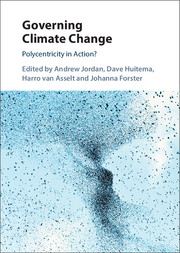Among the very many scholarly contributions made by Elinor Ostrom, the work she partially completed on climate change is the one now attracting increasing attention. Though the concept of polycentric governance was originally coined in the 1960s by her husband, Vincent Ostrom, her attempt to refashion it to understand and influence the everyday practices and study of climate change is inspiring a great deal of new work, including this book.
Climate change is often characterised as a ‘wicked’ – possibly even the most wicked – policy problem. Many decades of multilateral climate diplomacy have arguably resulted in very meagre progress; global emissions have not yet peaked and the probability that warming will eventually exceed two degrees centigrade above pre-industrial levels remains high. When Elinor Ostrom entered the climate governance debate in the late 2000s, the political world was in a very different place from where it is today. Diplomats were still reeling from the unexpected failure of the 2009 Copenhagen conference to adopt a new international climate agreement. Since then, political conflicts have continued to bedevil the United Nations Framework Convention on Climate Change, in spite of the provision of even more scientific information (ably marshalled by the Intergovernmental Panel on Climate Change) on the causes and consequences of warming. The 2015 Paris Agreement was hailed as an unexpected success and a reminder that international diplomacy should not be entirely written off. Yet barely a year later, the fickle nature of politics was powerfully re-emphasised when Donald Trump announced his decision to withdraw the United States from the Paris Agreement, even though it arguably hands states more decision-making power than its predecessor, the Kyoto Protocol.
By contrast, Elinor Ostrom’s message was a much more hopeful one: do not despair if politics moves slowly at the international and national levels because a diversity of actors and institutions is already self-organising in ways that will help to compensate for the collective action problems at the higher levels. No wonder that it resonated so widely and so powerfully amongst scholars and practitioners. Not only was it politically refreshing but it was also conceptually and theoretically unconventional in the way it sought to comprehend climate governance in toto rather than from a series of well-established, but partial, perspectives.
Although scholarship on polycentric climate governance has grown exponentially since Ostrom’s passing in 2012, nobody has attempted to perform the systematic test of the ideas that she originally envisaged. As polycentricity attracts growing interest, now seems a particularly opportune moment not only to clarify her theoretical claims but to test them out more fully. As we explain in Chapter 1, the fact that the literature has expanded so much in the past decade indicates that this important task is considerably more challenging than she had originally thought, going well beyond what can be realistically delivered by a single research team. This book seeks to address that challenge by combining the expertise of established and upcoming scholars, each drawing on many different bodies of work. In many ways, the production of this book itself became an exercise in polycentric scholarship.
Although many book projects have a long gestation, we have been very fortunate to have worked with a group of very dedicated and responsive experts on climate governance who were able to deliver very rapidly. Their hard work and commitment has made our editorial task an especially pleasant one. Specifically, we would like to thank all the contributors for entering into the spirit of collective scholarship, pushing the boundaries of their existing research and engaging critically with the concept of polycentric governance. We believe that the joint author workshop (and subsequent Spring School) held at the Open University of the Netherlands in Heerlen in March 2017 allowed everyone to start from the same page. We would like to thank Angela Oels, Raoul Beunen, Pia Buschmann, Mimi Crijns, Judith Floor, James Patterson and Danielle Tissingh for their very capable assistance in organising both meetings. Without their work, this book would quite simply never have come to fruition.
This book would not have been possible without the generous funding provided by the Netherlands Royal Academy of Sciences and Arts (KNAW) and the EU’s COST programme, specifically its Action IS1309 on Innovations in Climate Governance (INOGOV, 2014–2018). Not only did COST contribute the lion’s share of the funding for the workshop, but it also paid for this book to be made available to anyone in the world through an Open Access agreement. It also funded the production of a massive open online course (MOOC) on polycentric climate governance. To download additional copies of this book, complete the MOOC and/or learn more about INOGOV’s work, please go to: www.inogov.eu.
A number of other individuals played an important part in the publication of this book. Within the INOGOV core group, Mikael Hildén and Jonas Schoenefeld provided very thoughtful comments on various chapters, and Clare Shelton stepped into the breach when one of us, Johanna, took maternity leave from her role as INOGOV’s Network Manager. At Cambridge University Press, Matt Lloyd, Emma Kiddle and Zoë Pruce have been very supportive from the early stages. We are grateful to them and the three referees who provided very helpful feedback at an early stage in the production process. The considerable logistical challenge of completing a 20-chapter book involving 40 separate authors was made considerably easier by the tremendous editorial assistance provided by Zoha Shawoo. Zoha – we bet that you will never pick up and ‘read’ a book in quite the same way ever again!
Finally, we would like to thank our families for their continuous support (and patience!) throughout the writing of this book.



